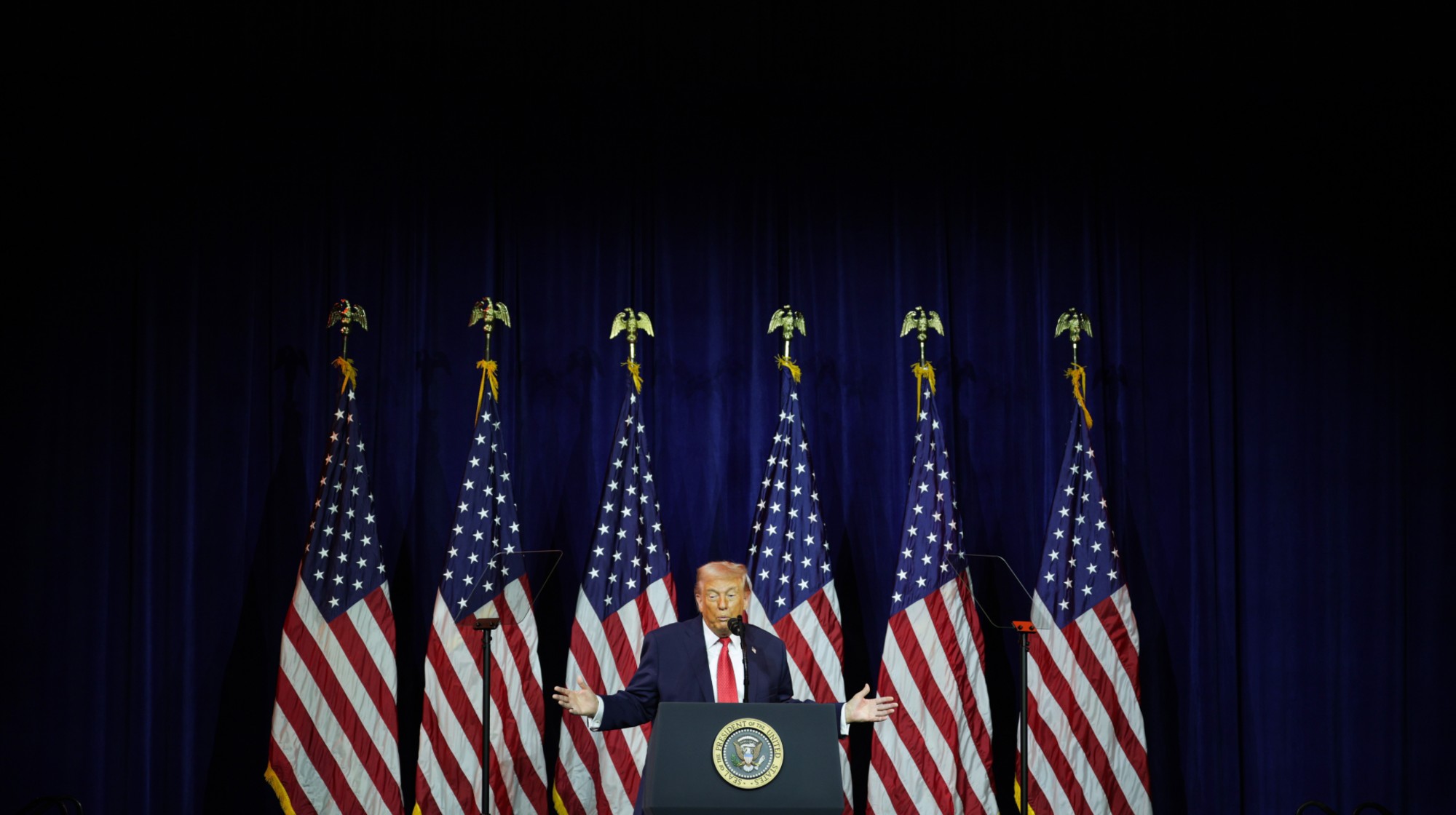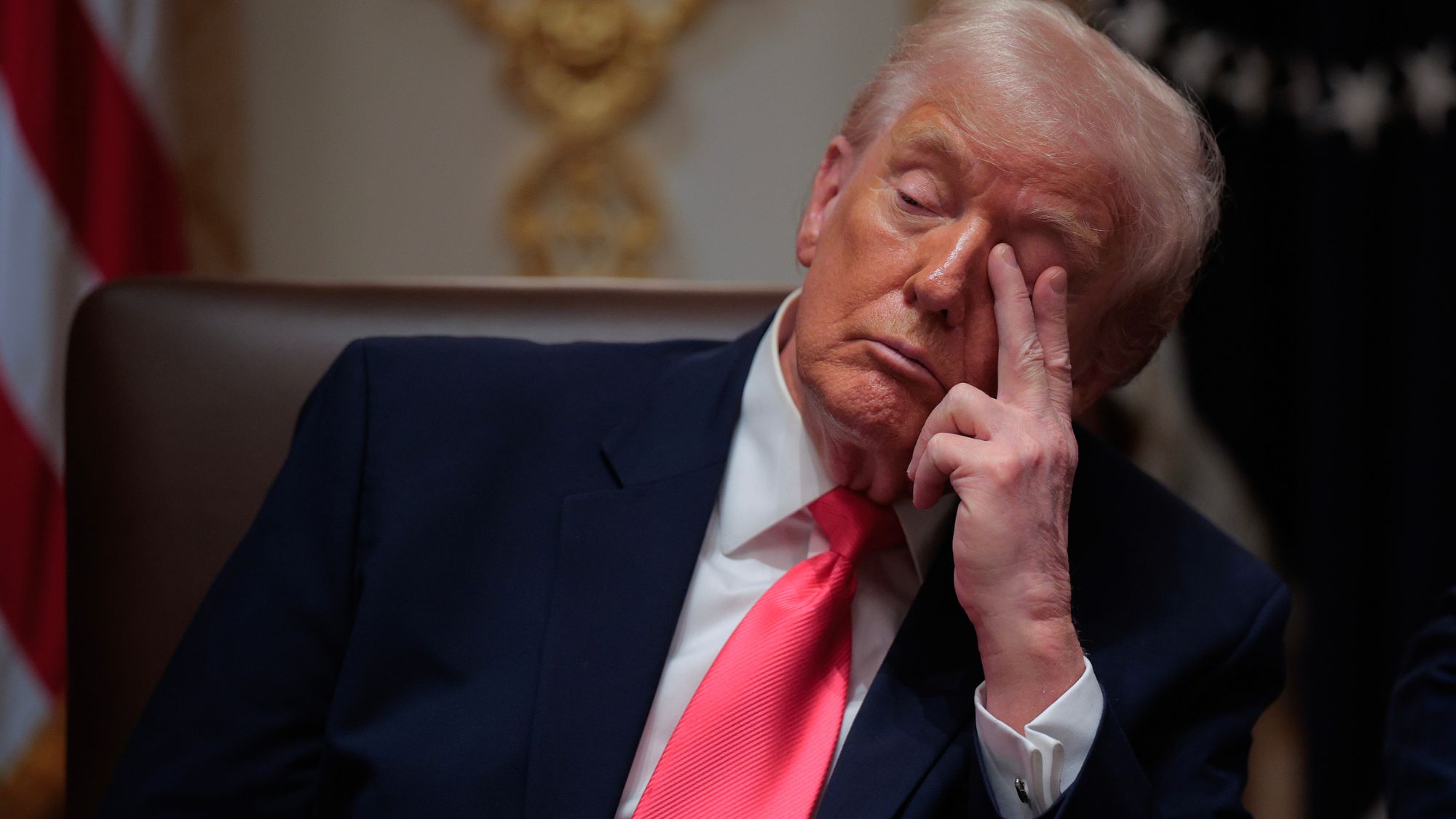Impeaching Trump is only going to get more popular
Polls are already showing Americans giving the thumbs up to impeachment. If Trump's history is any guide, it will only grow more popular.

A free daily email with the biggest news stories of the day – and the best features from TheWeek.com
You are now subscribed
Your newsletter sign-up was successful
Data emerged Thursday which suggests that impeachment, far from being the public opinion albatross that some leading Democrats had long feared, might actually work in the party's favor. And as the devastating Ukraine scandal continues to unfold, it is only a matter of time before a decisive majority of Americans start telling pollsters that they favor the impeachment of President Trump and his removal from office.
The survey organization YouGov asked respondents "If President Donald Trump suspended military aid to Ukraine in order to incentivize the country's officials to investigate his political rival, Joe Biden, and his son, would you support or oppose impeachment?" Fifty-five percent said they would strongly or somewhat support. That poll was done on Tuesday. Then a SurveyMonkey/Business Insider poll collected Wednesday and Thursday showed 53 percent support for opening an impeachment inquiry in the House. And Morning Consult found a net 13 point swing in favor of impeachment just since the weekend. That is a huge change from similar polls taken before the damning summary of President Trump's July 25 phone call with Ukrainian Pres. Volodmyr Zelensky was released.
This swift change in public opinion — which is likely to accelerate rapidly — might look abrupt, but it shouldn't have been unexpected.
The Week
Escape your echo chamber. Get the facts behind the news, plus analysis from multiple perspectives.

Sign up for The Week's Free Newsletters
From our morning news briefing to a weekly Good News Newsletter, get the best of The Week delivered directly to your inbox.
From our morning news briefing to a weekly Good News Newsletter, get the best of The Week delivered directly to your inbox.
Throughout his time in office, President Trump has demonstrated a unique gift: Whatever policy or idea he gets behind is subsequently opposed by the public, often decisively. His only legislative achievement to date, for instance, the December 2017 tax reform, was still under water the last time Gallup checked. By roughly 60 percent to 40 percent, Americans oppose construction of a wall along the southern border, a plan the president seems to care about more than anything else in the world. Sixty percent of Americans also want immigration levels to stay the same or increase, as opposed to 35 percent who want them decreased.
But the data trends are generally even worse for Trump. Since the beginning of his term, there has been a significant increase in Americans saying they want increased immigration levels, a once fringe position that has been bolstered over the past few years by the president's relentless nativism and immigrant scapegoating. It's not just that President Trump is incapable of bringing all but his diehards along with him on most issues, it's that he's so actively repellent to most ordinary human beings that he boosts the polar opposite position.
The second reason that support for impeachment might be jumping is that the president has been nabbed with his pasty hands in the Big Mac jar in a way that might shock even rank-and-file Republicans. The Ukraine scandal is, from start to finish, unspinnably terrible for President Trump. Even if you believe that his call with Zelensky lacked an explicit quid pro quo, one of those Law & Order, "I never told you the victim had a thigh tattoo so how did you know it was there?" moments, you might still wonder why the president of the United States felt the need to ask a newly elected foreign leader for help in investigating the leading Democratic contender for president and his son. There is no ongoing U.S. investigation into the Bidens. There is no reasonable explanation for the president's behavior other than open and shameless contempt for U.S. law.
The reaction from the right on this point has thus far been pitiful, because there's really nothing to spin. This is what happened, and the White House then made the extremely puzzling decision to release the summary memo of the call instead of once again telling House Democrats that their oversight powers are Fake News. No one could possibly dispute that this is what Trump did and said, because the whistleblower complaint lays it out, the memo confirms it, Trump confirms it and Zelensky confirms it. We're at the moment in the police procedural where the suspect suddenly admits to the crime and the detectives look at each other like, did that really just happen? Are we done here? Can we go get some beers and Chinese food now?
A free daily email with the biggest news stories of the day – and the best features from TheWeek.com
You know it's bad when leading Republicans are flailing so badly to land on a single workable talking point. Sen. John Thune (R-S.D.): "Trump's got a different style when it comes to being president." Sen. Ron Johnson (R-Wis.): "When the American people take a look at that entire conversation, [they'll discover] he sounds like a pretty gracious guy." Sen. Lindsay Graham (R-S.C.): "I'm glad the aid started flowing so there is no quid pro quo. I feel good about this."
Narrator voice: He does not feel good about this. What are they even talking about? The issue here is not that the president was mean or rude to Zelensky or bestowed one of his grammar school nicknames on him, but rather that he asked the man to produce damaging information on a likely election opponent and then apparently had his underlings bury the call notes by loading them into a server used to store classify documents, a practice the Trump administration allegedly uses to hide all sorts of things the president says. Reminder: Violating the law is not a "style." It's not "gracious." It is crime.
Attitudes about impeachment have also been affected by splits in the Democratic leadership. Until this week, there were still very influential Democrats, including Speaker Pelosi, her deputy Steny Hoyer as well as opinion-shapers like Five Thirty Eight's Nate Silver either expressing caution about the process or opposing it straight up. That lack of unity meant that only about two-thirds of Democrats said they supported it prior to this week's revelations about the Ukraine affair. With pretty much the entire party (outside of Tulsi Gabbard) now on board, you can expect that number to shoot up dramatically, something that activists have been shouting into the void since party elites caved in the aftermath of former Special Counsel Robert Mueller's July testimony.
But there is more to it than that. The events that Mueller testified about were at that point mostly between two and three years old, basically two lifetimes in D.C. The president had spent the two years of Mueller's investigation firing rhetorical T-shirts into the crowd with his Twitter cannon, successfully redirecting the right-wing media machine to focus on the probe's origins, the partisan leanings of its prosecutors, the role of the Clinton campaign, and more. Today, events are simply moving too fast for the president to craft the narrative in the same way. The case is also substantially less complicated — there are no Russian cutouts to obsess over, no mysterious Russian hackers to identify, no murky Manafortian motives to suss out, no low-level staffers to blame everything on, no finer points of the non-intuitive idea of obstruction of justice to clarify for voters. There's just President Trump violating this section of the Federal Election Campaign Act in a way that is difficult for anyone who isn't facing a Republican primary challenger next year to deny.
Where will the impeachment number ultimately land? A pretty good guess is that support for impeaching the president and removing him from office will ultimately converge on his disapproval rating. That doesn't mean that President Trump will be removed from office by the Senate, but it also suggests that it will be Republicans, rather than Democrats, who pay a political price for that sordid denouement.
Want more essential commentary and analysis like this delivered straight to your inbox? Sign up for The Week's "Today's best articles" newsletter here.
David Faris is a professor of political science at Roosevelt University and the author of "It's Time to Fight Dirty: How Democrats Can Build a Lasting Majority in American Politics." He's a frequent contributor to Newsweek and Slate, and his work has appeared in The Washington Post, The New Republic and The Nation, among others.
-
 The Week Unwrapped: Do the Freemasons have too much sway in the police force?
The Week Unwrapped: Do the Freemasons have too much sway in the police force?Podcast Plus, what does the growing popularity of prediction markets mean for the future? And why are UK film and TV workers struggling?
-
 Properties of the week: pretty thatched cottages
Properties of the week: pretty thatched cottagesThe Week Recommends Featuring homes in West Sussex, Dorset and Suffolk
-
 The week’s best photos
The week’s best photosIn Pictures An explosive meal, a carnival of joy, and more
-
 Democrats pledge Noem impeachment if not fired
Democrats pledge Noem impeachment if not firedSpeed Read Trump is publicly defending the Homeland Security secretary
-
 The billionaires’ wealth tax: a catastrophe for California?
The billionaires’ wealth tax: a catastrophe for California?Talking Point Peter Thiel and Larry Page preparing to change state residency
-
 Trump fears impeachment if GOP loses midterms
Trump fears impeachment if GOP loses midtermsSpeed Read ‘You got to win the midterms,’ the president said
-
 Bari Weiss’ ‘60 Minutes’ scandal is about more than one report
Bari Weiss’ ‘60 Minutes’ scandal is about more than one reportIN THE SPOTLIGHT By blocking an approved segment on a controversial prison holding US deportees in El Salvador, the editor-in-chief of CBS News has become the main story
-
 Democrat files to impeach RFK Jr.
Democrat files to impeach RFK Jr.Speed Read Rep. Haley Stevens filed articles of impeachment against Health and Human Services Secretary Robert F. Kennedy Jr.
-
 Trump’s poll collapse: can he stop the slide?
Trump’s poll collapse: can he stop the slide?Talking Point President who promised to ease cost-of-living has found that US economic woes can’t be solved ‘via executive fiat’
-
 Has Zohran Mamdani shown the Democrats how to win again?
Has Zohran Mamdani shown the Democrats how to win again?Today’s Big Question New York City mayoral election touted as victory for left-wing populists but moderate centrist wins elsewhere present more complex path for Democratic Party
-
 Millions turn out for anti-Trump ‘No Kings’ rallies
Millions turn out for anti-Trump ‘No Kings’ ralliesSpeed Read An estimated 7 million people participated, 2 million more than at the first ‘No Kings’ protest in June
